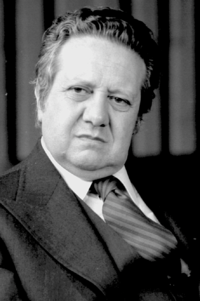
Photo from wikipedia
with some (frail) form of power sharing, Angola’s peace came about “with the government’s ferocious vanquishing of the . . . rebellion,” which implied a total victory and “an uncompromising… Click to show full abstract
with some (frail) form of power sharing, Angola’s peace came about “with the government’s ferocious vanquishing of the . . . rebellion,” which implied a total victory and “an uncompromising mastery over Angola” (p. 3). Soares de Oliveira also describes how the petroleum and diamond resources were the means by—and ultimate prize for—which the civil war was fought, and how these resources are the lifeline and “raison de vivre” of the ruling elite today. This particularly rich endowment of resources is the backbone of Angola’s economy, for good and for bad. For good, it made impressive economic growth; for bad, it entrenched a nonredistributive authoritarian regime in power, supported by both China and Western “collaborators.” Angola highlights the “Africa rising” debate. Is Africa, with Angola as an example, on the rise economically and politically? Is it moving toward diversified growth and democratization, or is the widely reported political and economic progress merely the icing on the cake that conceals a persistent political and economic monoculture? Soares de Oliveira’s claim that the MPLA regime has “an uncompromising mastery over Angola” are other words for what I have learned to know as one of the world’s most arrogant regimes. Angola’s rulers, like Vietnam’s, has won a war against the world’s superpower, and this fact seems to have imbedded in them the moral right to rule the country exclusively far into the future. The implication is also that any opposition is seen as subversion and treason, and handled accordingly. The author talks at length about the crushing of the main contender UNITA in 2002, the ongoing repression of the Cabindan separatists, and the brutal repression of street demonstrations and opposition parties. In addition to Soares de Oliveira’s description of Angola’s patrimonial rentier regime and party-state, his description of Angola’s economy is outstanding. We get the sense of a static economy established to serve the interests of the rulers, as “Angola has no alternative, virtuous capitalists waiting in the wings to replace the oligarchs” (p. 164). The poor majority will remain poor, as “the party has not shifted towards mass distribution.” With the current economic crisis caused by drastically reduced oil prices, government expenditures on social sectors are going down, for instance with massive cuts in education, with the exception of the funds for university education—“the social mobility ticket of the national bourgeoisie” (p. 214). The author’s wording is for the most part sober and academic, as it should be. At the same time, his language is colorful and vivid, and sometimes his British-style understatements underscore the importance of an argument. However, some of the terms used (for instance, to qualify the excesses of the ruling elite) could have been even sharper, and I miss two important debates on Angola. I miss a more profound analysis of the personality and family of the president. Eduardo dos Santos’s long rule (since 1979) is matched (worldwide) only by that of Equatorial Guinea’s president. Angola is also an example of an increasingly nepotistic country, with the president’s son as the director of the country’s “sovereign” petroleum fund, and with his daughter—Africa’s first dollar billionaire and richest woman—as the director of the state oil company. She is also a “potential successor,” according to the national government-controlled media, and both are members of the MPLA Central Committee. Other children, ex-wife, cousins, and their spouses (that is, the extended family) are found in prominent positions within the state apparatus and state-led economy. The president’s personality and his family must clearly have a bearing on politics. The other debate missing is the impact of ethnicity. We have seen a recent resurge of ethno-regionalism in other countries in southern Africa (Zambia, Zimbabwe, and Malawi spring to mind), and the Angolan “civil war” had some strong ethnic overtones. The latter and the creole/assimilado/mestiço origins of the ruling elite are displayed by Soares de Oliveira as a part of the historical background (p. 7–9), but the impact of ethno-regionalism in current politics is not well explored. Magnificent and Beggar Land follows chronologically after what I see as the two most prominent books on Angola: Angola, the Weight of History, edited by Patrick Chabal and Nuno Vidal (2007) and Angola: Anatomy of an Oil State, by Tony Hodges (2004). Truly, this timely book gives the background for what I believe will happen next: With the drastic reduction of Angola’s petroleum revenues, the regime will defend its privileges even more violently.
Journal Title: Perspectives on Politics
Year Published: 2017
Link to full text (if available)
Share on Social Media: Sign Up to like & get
recommendations!